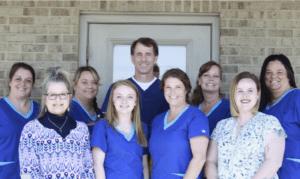When your child needs an oral surgery, it’s natural to be nervous and concerned. You want a maxillofacial specialist who understands the unique needs of infants and children – not only surgically, but practically as well. And while pediatric oral and maxillofacial medicine isn’t necessarily separate from adult oral surgery, it has its logistical differences, and bedside manner is of the utmost importance.
Dr. Puckett and his staff are experts in treating the pediatric population; we have provided oral surgery treatment to patients as young as two days old. Our oral surgery practice is based in Wilmington, and we’ve treated children from all over Southwest and South Central Ohio and the Greater Cincinnati & Dayton Areas, helping them and their families navigate their maxillofacial procedures with as much care as possible.
Pediatric Dental Services at Wilmington Oral Surgery
At the initial consultation visit, Dr. Puckett will not only evaluate and discuss the treatment plan, but will allow time to have questions and concerns answered. We understand how difficult medical intervention in infants and small children can be for parents, and we strive to make each process for each child as safe and simple as possible.
There are many moving parts that must be carefully coordinated when performing oral or maxillofacial surgery on children of any age. A pediatric wisdom teeth bone graft is not the same as one for an adult. Similarly, a cleft palate surgery has to take into account constant movement and growth of the structures within the face and head of a developing child.
A Skilled Pediatric Oral Surgeon with the Right Resources
We take your child’s needs to heart and proceed with surgical treatment only after fully-informed on their medical history and other relevant health information. As well, Dr. Puckett is licensed in all forms of anesthesia and sedation for oral surgery. We often use sedation methods during pediatric procedures to minimize the stress of the surgery on the child.
As a parent, you’re naturally going to be protective of your child; oral surgery can be daunting at any age. But rest assured, Dr. Puckett is the best pediatric maxillofacial surgeon in Cincinnati, both in skill and compassion. Between our practice’s patient-centered culture, our surgeon’s skill and his close relationships with other pediatric orofacial specialists, we can help your child experience the best version of themselves.
Common Pediatric Oral Surgeries & Conditions We Treat
For most children, we provide sedation for oral surgeries – it reduces anxiety and minimizes the potential for an unpleasant experience. Especially in small children, the experience of oral surgery, or surgery of any kind, can have long-lasting psychological effects for the patient. We combat that with our friendly, gentle staff, our pain-management methods, and a little help from a bit of anesthesia, which is administered and monitored with the utmost attention to your child’s safety.
In infants and toddlers, proper care and attention during even an invasive maxillofacial surgery can mean your child might not even remember the surgery at all. In fact, this is one distinct advantage to correcting mouth and jaw problems as early on in life as possible: because children are still developing, they can often “grow out of” any pathologies or physical trauma that was properly handled as early on in life as was safe for the child.
Pediatric oral surgery patients are frequently seen for a number of procedures, including:
- Removal of primary (baby) teeth. Baby teeth usually fall out by themselves, or are knocked out when the child has a mouth impact. We only take them out when an adult tooth is coming in and doesn’t have room to erupt properly.
- This involves cutting the piece of tissue connecting the tongue to the mouth. The procedure is done when the frenulum is too short or tight, making it difficult for a baby to breastfeed.
- Removal of adult teeth (usually for braces). If teeth are crowded, we remove one or more teeth; then the remaining teeth can be moved into correct positioning with braces.
- Exposure of teeth. One of our most common pediatric procedures is the surgical exposure of impacted teeth, such as impacted canines. Canines are sometimes slow to come in and exposing the tooth can aid eruption, combined with orthodontic treatment. The goal is always to preserve these teeth, which are critical to a normal bite.
- Removal of supernumerary (extra) teeth. It is not unusual for extra teeth to grow behind or in front of baby or permanent teeth.
Pediatric Orofacial Conditions We Treat with Surgical Intervention
Another type of pediatric oral surgery that we perform at an extremely tender age is surgery for orofacial clefts. These are congenital and can be caused by a variety of factors, including genetics or fetal complications associated with tobacco, drug and alcohol use during pregnancy. Orofacial clefts include:
- Cleft lip: This is when the soft tissues around the lip/nose do not properly join during fetal development, leading to a gap in the lip that can be anything from a small notch to a complete gap that runs up to the bottom of the nose.
- Cleft palate: This is when the hard tissues of the palate fail to properly join during fetal development, leading to a gap in the palate that can be anything from a small joining failure to a complete gap that runs the length of the palate.
- Cleft lip and palate: Often, this is the expression of a “cleft lip” we see, which is where both the hard and soft tissues of the lip and palate fail to properly join. This condition also occurs on a spectrum of severity.
Cleft lips and palates can leave children to grow up with poor dental health, breathing problems, speaking issues, and recurring ear, nose and throat infections. As well, having an appearance that differs from their peers can have dire psychological impacts on development and self-esteem. But with early intervention, our maxillofacial surgeon, Dr. Puckett, has seen many of his patients grow up with little to no evidence they were born with a cleft palate at all.
Gentle, Skilled Care for our Pediatric Oral Surgery Patients
Like we said earlier, we understand how hard it can be for parents to put their child in a situation where they have to undergo a procedure that includes anesthesia, even if it’s just cosmetic dental implants for missing adult teeth, or a typical wisdom tooth extraction. But the reason some oral surgeons specialize in pediatric maxillofacial surgeries is because often these interventions are much easier for the child to recover from the earlier in the child’s development they’re performed. That’s one of the main reasons we’ve made it a priority to specialize in pediatric oral surgery and aftercare.
Call our office today for any questions about the full spectrum of pediatric oral surgeries and interventions we perform, and what those processes entail. We always sit down and consult with both the parent and the child before any oral surgical procedure is formed. We’re here to answer as many questions as you have, and will do everything we can to make you feel right at home and that your child is in good hands.









